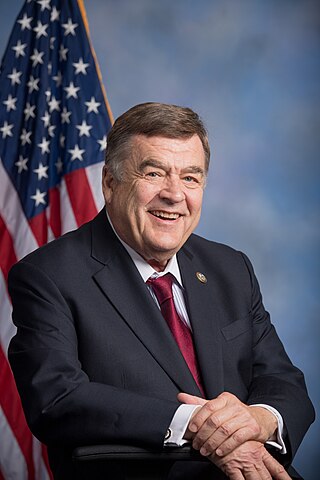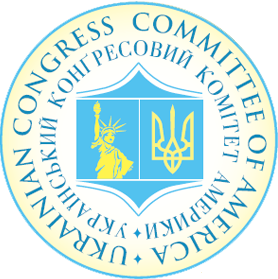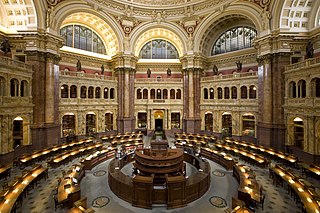Related Research Articles

The president of the United States (POTUS) is the head of state and head of government of the United States of America. The president directs the executive branch of the federal government and is the commander-in-chief of the United States Armed Forces.

The United States Congress is the legislature of the federal government of the United States. It is bicameral, composed of a lower body, the House of Representatives, and an upper body, the Senate. It meets in the U.S. Capitol in Washington, D.C. Senators and representatives are chosen through direct election, though vacancies in the Senate may be filled by a governor's appointment. Congress has 535 voting members: 100 senators and 435 representatives. The U.S. vice president has a vote in the Senate only when senators are evenly divided. The House of Representatives has six non-voting members.

The federal government of the United States is the national government of the United States, a federal republic located primarily in North America, composed of 50 states, five major self-governing territories, several island possessions, and the federal district and national capital of Washington, D.C., where most of the federal government is based.

Charles Albert "Dutch" Ruppersberger III is an American lawyer and politician serving as the U.S. representative for Maryland's 2nd congressional district since 2003. A member of the Democratic Party, he served as an assistant state attorney of Maryland from 1972 to 1980, a Baltimore County councilman from 1985 to 1994, and Baltimore County Executive from 1994 until 2002. He was the ranking member of the United States House Permanent Select Committee on Intelligence from 2011 to 2015.

Christopher Van Hollen Jr. is an American attorney and politician serving as the junior United States senator from Maryland since 2017. A member of the Democratic Party, Van Hollen served as the U.S. representative for Maryland's 8th congressional district from 2003 to 2017.

The United States Senate Committee on Appropriations is a standing committee of the United States Senate. It has jurisdiction over all discretionary spending legislation in the Senate.

The United States Intelligence Community (IC) is a group of separate U.S. federal government intelligence agencies and subordinate organizations that work both separately and collectively to conduct intelligence activities which support the foreign policy and national security interests of the United States. Member organizations of the IC include intelligence agencies, military intelligence, and civilian intelligence and analysis offices within federal executive departments.
Congressional staff are employees of the United States Congress or individual members of Congress. The position first developed in the late 19th century, and it expanded significantly during the 20th century. Staffers may work with individual members of Congress, or they may be associated with committees or other organizations that support Congress.

The United States Senate Select Committee on Intelligence is dedicated to overseeing the United States Intelligence Community—the agencies and bureaus of the federal government of the United States that provide information and analysis for leaders of the executive and legislative branches. The Committee was established in 1976 by the 94th Congress.

The Architect of the Capitol (AOC) is the federal agency responsible for the maintenance, operation, development, and preservation of the United States Capitol Complex. It is an agency of the legislative branch of the federal government and is accountable to the United States Congress and the Supreme Court. Both the agency and the head of the agency are called "Architect of the Capitol". The head of the agency is appointed to a 10-year term by the president of the United States, confirmed by the United States Senate, and is accountable to the president.

Voting rights of citizens in the District of Columbia differ from the rights of citizens in the 50 U.S. states. The United States Constitution grants each state voting representation in both houses of the United States Congress. It defines the federal district as being outside of any state, and does not grant it any voting representation in Congress. The Constitution grants Congress exclusive jurisdiction over the District in "all cases whatsoever".
Congressional oversight is oversight by the United States Congress over the executive branch, including the numerous U.S. federal agencies. Congressional oversight includes the review, monitoring, and supervision of federal agencies, programs, activities, and policy implementation. Congress exercises this power largely through its congressional committee system. Oversight also occurs in a wide variety of congressional activities and contexts. These include authorization, appropriations, investigative, and legislative hearings by standing committees; which is specialized investigations by select committees; and reviews and studies by congressional support agencies and staff.
The Gang of Eight is a colloquial term for a set of eight leaders within the United States Congress who are briefed on classified intelligence matters by the executive branch. Specifically, the Gang of Eight includes the leaders of each of the two parties from both the Senate and House of Representatives, and the chairs and ranking minority members of both the Senate Committee and House Committee for intelligence as set forth by .
Title 2 of the United States Code outlines the role of Congress in the United States Code.

The Ukrainian Congress Committee of America or UCCA is a non-partisan non-profit national umbrella organization uniting 30 national Ukrainian American organizations in advocating for over 1,000,000 Americans of Ukrainian descent. Its membership is composed of fraternal, educational, veterans, religious, cultural, social, business, political and humanitarian organizations, as well as individuals. Established in 1940, the UCCA maintains local volunteer chapters across the United States, with a national office based in New York City, as well as a Washington, D.C., news bureau, the Ukrainian National Information Service. The humanitarian aid committee, the United Ukrainian American Relief Committee, is headquartered in Philadelphia, Pennsylvania.
United States Intelligence Community Oversight duties are shared by both the executive and legislative branches of the government. Oversight, in this case, is the supervision of intelligence agencies, and making them accountable for their actions. Generally oversight bodies look at the following general issues: following policymaker needs, the quality of analysis, operations, and legality of actions.

The Library of Congress (LOC) is a research library in Washington, D.C., that serves as the library and research service of the U.S. Congress and the de facto national library of the United States. Founded in 1800, the library is the United States's oldest federal cultural institution. The library is housed in three elaborate buildings on Capitol Hill. It also maintains a conservation center in Culpeper, Virginia. The library's functions are overseen by the Librarian of Congress, and its buildings are maintained by the Architect of the Capitol. The Library of Congress is one of the largest libraries in the world. Its collections contain approximately 173 million items, and it has more than 3,000 employees. Its collections are "universal, not limited by subject, format, or national boundary, and include research materials from all parts of the world and in more than 470 languages".

The United States House of Representatives is the lower chamber of the United States Congress, with the Senate being the upper chamber. Together, they comprise the national bicameral legislature of the United States. The House is charged with the passage of federal legislation, known as bills; those that are also passed by the Senate are sent to the president for signature or veto. The House's exclusive powers include initiating all revenue bills, impeaching federal officers, and electing the president if no candidate receives a majority of votes in the Electoral College.

The Legislative Branch Appropriations Act, 2015 is an appropriations bill that would make appropriations for the United States Congress for fiscal year 2015. The bill is considered one of the two easiest appropriations bills to pass each year. The bill would appropriate $3.3 billion to the legislative branch for FY 2015, which is approximately the same amount it received in FY 2014.
Congressional archives consist of records and personal papers that document the history and activities of the United States Congress. The National Archives and Records Administration’s Center for Legislative Archives collects and preserves the official administrative and legislative records of the U.S. Senate and the U.S. House of Representatives. The personal papers of individual senators and representatives, broadly called congressional collections, are the private property of members of Congress. Many members choose to donate their papers to repositories where their records are preserved and made available to the public.
References
- ↑ "Open World Leadership Center". Keystone Human Services. Retrieved 8 January 2016.
- ↑ "Message from the Executive Director". Open World Leadership Center. Retrieved 11 January 2016.
- ↑ "Open World Program Overview". American Councils for International Education. Retrieved 11 January 2016.
- ↑ "Open World Awards Grant to the U.S.-Ukraine Foundation". U.S.-Ukraine Foundation. Retrieved 11 January 2016.